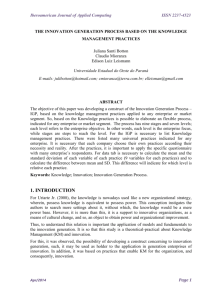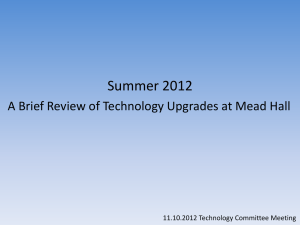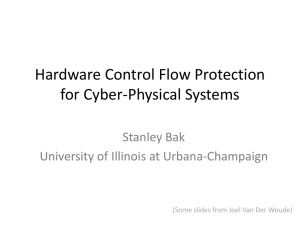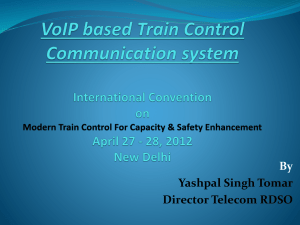Automated Dividing Multiple Domains
advertisement
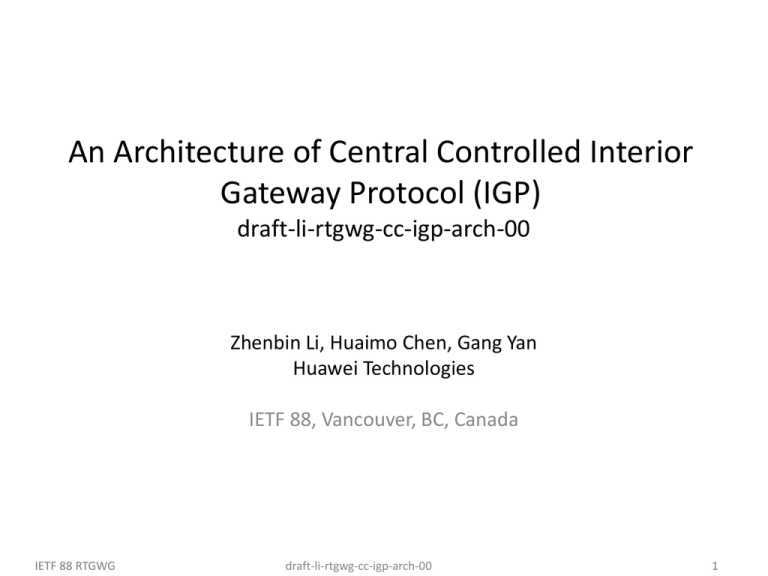
An Architecture of Central Controlled Interior Gateway Protocol (IGP) draft-li-rtgwg-cc-igp-arch-00 Zhenbin Li, Huaimo Chen, Gang Yan Huawei Technologies IETF 88, Vancouver, BC, Canada IETF 88 RTGWG draft-li-rtgwg-cc-igp-arch-00 1 Introduction • • • As the Software Defined Networks (SDN) solution develops, IGP will be extended to support central control. This document introduces an architecture of using IGP for central control. Some use cases under this new framework are also discussed. For specific use cases, making necessary extensions in IGP are required. IETF 88 RTGWG draft-li-rtgwg-cc-igp-arch-00 2 Architecture -- Reference Model • • The following figure depicts a typical architecture of central controlled IGP. It consists of two essential network elements: IGP Controller and IGP Client. IGP Controller controls all the IGP Clients within its administrative domain by communicating with them. IETF 88 RTGWG draft-li-rtgwg-cc-igp-arch-00 3 Architecture -- Deployment Mode • IGP Controller can run on a general-purpose server or a network device. – – If IGP Controller runs on a network device, it supports both central-controlled functionality and forwarding functionality. The forwarding model in this scenario is just like hub-spoke forwarding model. If IGP Controller runs on a server, it will not involve in the actual forwarding. In this scenario the traffic will be distributed in the controlled nodes. IETF 88 RTGWG draft-li-rtgwg-cc-igp-arch-00 4 Architecture -- Protocol Extensions • Building Connectivity: – – • Roles Auto-Discovery: – – • After the roles of the elements are discovered, if there are multiple controllers in the domain, the client can determine which controller to join by its own, or the controllers can determine which controller the clients should join and set the configuration on the nodes through I2RS interface. High Availability: – • In the central control domain, there are two basic roles: IGP controller and IGP client. The controller can centrally configure the client role through I2RS interface. The role information should be flooded through IGP extensions to support the auto discovery functionality. Choosing Controller: – • When a new device connects to the this domain, the connectivity with the other node and the controller should be built at first through IGP extensions. The procedures should be automated since the number of devices in this domain can be huge. To avoid one-point-failure of IGP Controller, it is possible to run redundant IGP Controllers for high availability. Security IETF 88 RTGWG draft-li-rtgwg-cc-igp-arch-00 5 Use Cases In IGP-based Central Controlled framework, new use cases are emerging: • Network Topology Acquirement – – In the IGP-based central controlled framework, the topology acquirement procedures SHOULD be simplified. All topology related information SHOULD be able to be collected by IGP. Thus the complexity of network operation and management can be reduced. In the IGP-base central controlled framework, the controller can get the whole topology information of the central control domain which can be easily provided for applications through public interface. IETF 88 RTGWG draft-li-rtgwg-cc-igp-arch-00 6 Use Cases(Cont.) • Automated Dividing Multiple Domains – – [draft-ylz-ospf-lsdb-sync-group-01] proposed optimized database synchronization mechanism: IGP adjacency can be only set up between nodes in the same IGP domain. Thus the pressure on the nodes for LSDB synchronization can be reduced and route convergence performance can be improved. In the IGP-based central controlled framework, the domain division can be done automatically by the controller which can calculate reasonable scale for IGP domains. IETF 88 RTGWG draft-li-rtgwg-cc-igp-arch-00 7 Use Cases(Cont.) • Centralized MPLS TE – – In the IGP-based Central Controlled framework, the controller can implement better traffic engineering functionality because it can calculate more reasonable path based on complete topology information and state information of the whole network. In order to support centralized MPLS TE path calculation, IGP SHOULD be able to collect more information from the network. There are two types of information for IGP to collect: IETF 88 RTGWG Static configuration: In the IGP-based Central Controlled framework, these configuration can be set by the controller. Running information: Some dynamic state information such as real traffic bandwidth, packet loss rate, delay, power consumption, etc. can be flooded through IGP extensions from the nodes to the controller. draft-li-rtgwg-cc-igp-arch-00 8 Use Cases(Cont.) • MPLS Global Label Allocation – – – MPLS Global Label should be allocated centrally to guarantee all distributed network nodes can understand meaning of a specific global label in same. The IGP-based Central Controlled framework is particularly suitable to allocate MPLS Global Label through some necessary IGP extensions rather than traditional MPLS protocols(e.g. LDP, RSVP-TE etc.) Some useful cases: 1) Segment Routing, 2) MPLS Network Virtualization. More detailed description could be found in [draft-previdi-filsfils-isis-segmentrouting-02] and [draft-li-mpls-network-virtualizationframework-00]. IETF 88 RTGWG draft-li-rtgwg-cc-igp-arch-00 9 Use Cases(Cont.) • Virtual Link – – Partial Deployment:In the scenario, When the IGP-based Central Controlled framework is applied, one possible scenario is partial deployment. That is, part of the existing network will be converted to be controlled in the central control mode. The application scenario is shown in the following figure. In the central control domain, the controller can apply the policy defined by the applications to control whether the virtual link will be advertised to the outside and what metric is advertised to affect the route calculation of the outside network. IETF 88 RTGWG draft-li-rtgwg-cc-igp-arch-00 10 Next Steps • Solicit more comments & feedbacks • Revise the draft IETF 88 RTGWG draft-li-rtgwg-cc-igp-arch-00 11

